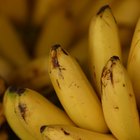sylv1rob1/iStock/GettyImages
An Easy Solution to Vegan Baking Challenges
Vegan baking can be challenging without the luxury of using eggs to bind ingredients into moist, cohesive dough. Fortunately, xanthan gum makes a worthy substitute, working well in everything from cookies to cakes. Xanthan gum sounds like the kind of articifial ingredient that health-conscious eaters have grown accustomed to avoiding, but it's actually a dehydrated gel made from fermenting sucrose or glucose. It's easy to use and increasingly easy to find on supermarket shelves. Despite the word "gum," it's actually a powder, one that's easy to combine with flours and sugars.
How to Use Xanthan Gum in Vegan Baking
For each egg called for in a recipe, substitute 1/4 teaspoon xanthan gum dissolved in 1/4 cup water. This mixture will bind together your vegan baked goods, making them moist and avoiding unpleasant crumbliness. However, unlike eggs, xanthan gum will not help your vegan baked goods to rise. To help them do so, add a bit of extra baking soda or baking powder (whichever the recipe calls for) to help with the leavening process.
Xanthan Gum in Gluten-Free Baking
In addition to being useful as an egg substitute in vegan baking, xanthan gum can help approximate the chewy, stretchy quality that gluten gives to traditional baked goods. This quality is useful in gluten-free baking, and especially in baking that is both gluten-free and vegan. If you're using a gluten-free baking mix, make sure it doesn't already contain xanthan gum because it is a common ingredient in these mixes. If you're using a gluten-free flour such as chickpea flour, start with 1/4 teaspoon xanthan gum for every cup of flour called for in the recipe. If the dough feels sticky and stretchy, you've probably added enough. If the dough feels crumbly, add more xanthan gum a pinch at a time until you achieve the desired texture.
Is Xanthan Gum Really Vegan?
Although xanthan gum works well as a substitute for eggs, the powder is sometimes made with nonvegan ingredients. An enzyme made from chicken may be used during the manufacturing process, and sometimes it is produced using lactose, a milk sugar, rather than sucrose or glucose. It is rare for xanthan gum to be made with these ingredients, but not impossible. To make sure the xanthan gum you're using is actually vegan, check the label for a third-party vegan certification or text that specifies that the product is truly vegan friendly.
Related Articles

How to Use Guar Gum to Replace Gelatin

Can You Use Konjac Flour in Baking?

How to Use Xanthan Gum in Baking

What Can You Use in Place of Egg Yolk ...

What Can I Use as an Egg Substitute ...

I Forgot to Put the Egg in the Banana ...

Can I Make Boxed Devil's Food Cake Mix ...

What Can I Use as an Egg Substitute ...

How to Dissolve Xanthan Gum

How to Replace Eggs With Applesauce, ...
How To Make Gluten Free Chicken Pot Pie

How to Replace Eggs With Mayonnaise
Baking With Almond, Rice & Coconut Flour

Can You Make Dumplings With Corn Starch?

What Is a Substitute for Potassium ...

Can I Substitute Bleached for ...

Gluten- and Wheat-Free Fiber Supplements

Can I Substitute Rolled Oats for Flour ...

Applesauce as an Egg Substitute for ...

What Happens if You Use Brownie Mix ...
References
Writer Bio
Devra Gartenstein is a self-taught professional cook who has authored two cookbooks: "The Accidental Vegan", and "Local Bounty: Seasonal Vegan Recipes". She founded Patty Pan Cooperative, Seattle's oldest farmers market concession, and teaches regular cooking classes.